Fleagle Endowed Lectures
The Robert Fleagle Visiting Faculty Fellowship in Atmospheric Sciences Policy at the University of Washington was established by Emeritus Professor of Atmospheric Sciences Robert G. Fleagle to broaden understanding for students, faculty, and the broader public of the interaction of the atmospheric sciences with national policy.
Lecture: “Geological Net Zero: How We Will Stop Fossil Fuels From Causing Global Warming”
May 25, 2023; 7:00 – 8:30 pm, Kane Hall 110*
Dr. Myles Allen, Professor of Geosystem Science, University of Oxford
*A recording of the lecture will be available to those that register for the event
To register for the event, please click here
About the Lecture
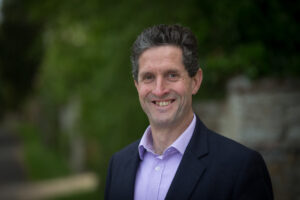
In a remarkably short space of time, net zero has become common currency. Yet as net zero commitments have proliferated, so has confusion about what they actually mean. I will explain what we originally meant by net zero: what it will take to achieve a durable halt to global warming. A durable net zero cannot rely on offsetting continued fossil fuel use with afforestation or nature-based solutions: the capacity of the global biosphere is limited, and even the definition of biological carbon dioxide removal is contestable. If it is to deliver our climate goals, net zero must therefore encompass geological net zero, a state in which, for every tonne of carbon dioxide still generated from fossil sources, one tonne is permanently restored to the geosphere, or solid earth, through carbon capture and geological storage, remineralisation or some equally permanent disposal. Geological Net Zero is surprisingly affordable, but won’t be delivered by conventional climate policies like carbon taxes or emission trading systems: it calls for a fundamental rethink of the role and duties of the fossil fuel industry itself. A global Alliance for Geological Net Zero may be the only way to stop fossil fuels from causing further global warming in time to meet Paris Agreement goals and could, therefore, represent a crowning achievement of the COP28 climate summit.
About the Speaker
Described by the BBC as “the physicist behind net zero” (https://www.bbc.co.uk/programmes/m000fgcn), Myles has been studying how human activities and natural drivers contribute to changes in global climate and weather since the early 1990s. In 2005, Myles first proposed the concept of a global carbon budget: that peak warming is largely determined by the total amount of carbon dioxide we release into the atmosphere, not the rate of emissions or the atmospheric concentration in any given year. He has long argued that fossil fuel producers should be central to the solution to climate change, rather than just part of the problem, which calls for policy innovation: e.g. https://go.ted.com/mylesallen. In 2010 he was awarded the Appleton Medal and Prize from the Institute of Physics and in 2022 a CBE for services to climate change prediction, attribution and net zero. Myles is a Professor of Geosystem Science in the Environmental Change Institute, School of Geography and the Environment and the Department of Physics, University of Oxford, and Director of the Oxford Net Zero initiative.
Lecture: “A Brief History of Environmental Successes”
April 11, 2019, 7:30-9:00 pm, Kane Hall 210
Dr. Susan Solomon, Lee and Geraldine Martin Professor of Environmental Science, MIT
About the Lecture
Humans have faced a series of national and global environmental challenges in the past half-century, including smog, the use of lead in gasoline, ozone depletion, and much more. This talk reveals how combinations of science, public policy, industry participation, and the engagement of citizens succeeded in addressing past environmental challenges. Finally, I probe how the lessons learned help us understand how to better manage today’s environmental problems, including climate change.
About the Speaker
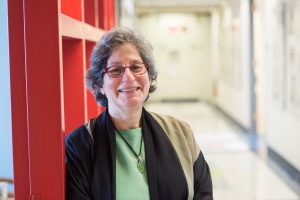
Susan Solomon is internationally recognized as a leader in atmospheric science, particularly for her insights in explaining the cause of the Antarctic ozone “hole”. She and her colleagues have also made important contributions to understanding chemistry/climate coupling, including leading research on the irreversibility of global warming linked to anthropogenic carbon dioxide emissions, and on the influence of the ozone hole on the climate of the southern hemisphere. Her current research focusses on both atmospheric chemistry and climate change. She is a member of the National Academy of Sciences and has received many honors for her work including our nation’s highest scientific award, the U. S. National Medal of Science.
Lecture: “Talking Climate: Why Facts are Not Enough”
May 15, 2018, 7:00-8:30 pm, Kane Hall 120
Dr. Katharine Hayhoe
Climate Scientist and Professor at Texas Tech University
About the Lecture
The human influence on climate has been established by thousands of scientific studies, stretching back more than 150 years. Today, however, public and political opinions on climate are becoming ever more sharply divided: along ideological, socio-economic, and even religious lines. Understanding the reasons that have created and fed this polarization is crucial to bridging this divide. It’s not a lack of information. No, the best predictor of opinions on climate change has nothing to do with how much we know about science, and everything to do with where we fall on the political spectrum. In such a deeply divided environment, it’s no surprise that 75% of people in the U.S. avoid talking about climate. But if we begin with values that we share, rather than facts we disagree on, it is possible to engage in productive conversations on this difficult issue.
About the Speaker

Dr. Katharine Hayhoe is an atmospheric scientist whose research focuses on understanding what climate change means for people and the places where we live. She is a professor at Texas Tech University and has been named one of TIME’s 100 Most Influential People and Fortune’s 50 World’s Greatest Leaders. As a world-class climate scientist and a Christian, Dr. Katharine Hayhoe may defy some stereotypes about the politics of religion and science. But defying stereotypes invites inquiry, which can lead to communication, even learning. It creates opportunity for thinking deeply about, and aligning, what we value and what we do. Climate change is a huge issue, and it’s one where citizen engagement is critical. That’s why her work is so fascinating: in part because it’s about climate change, and also because her main theme – faith and science – defies stereotypes.
Lecture: “Tackling Climate Change Security Threats: A Mounting Imperative for the Next President”
October 13, 2016, 7:00-8:30 pm, Kane Hall 220
Cathleen Kelly
Senior Fellow, Center for American Progress and Adjunct Professor of international and environmental policy
Johns Hopkins University – Paul H. Nitze School of Advanced International Studies (SAIS).
About the Lecture
After years as a back-burner domestic policy issue, climate change is well recognized as a pressing foreign policy and national security challenge. Extreme droughts, heat waves, floods, and other natural disasters—all symptoms of a warming world—are wreaking havoc around the globe, from humanitarian crises and mass migrations to food and water shortages, exacerbated poverty and accelerated conflict. In the U.S., more extreme weather driven by climate change has caused hundreds of billions of dollars in damages over the past decade. For these reasons U.S. Defense Department leaders flag climate change as a “threat multiplier,” and President Obama has made addressing climate change internationally a top foreign policy priority.
To avert, or at least lessen, future disasters, the next U.S. President will need to advance and implement new policies to cut U.S. emissions. She or he will also need to factor climate change into a foreign policy agenda to reduce the risk of more conflict, mass migrations, and climate-fueled chaos in a warming world. This talk will suggest a climate change-related to-do list for the next president.
Suggested Reading: The Mounting Threats of Climate Change
About the Speaker
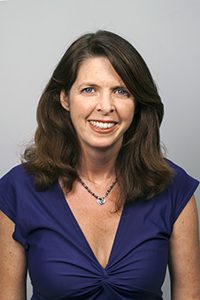
Cathleen Kelly is a Senior Fellow with the Energy and Environment team at the Center for American Progress. She specializes in international and U.S. climate mitigation, preparedness, resilience, and sustainable development policy. Kelly served in the Obama administration at the White House Council on Environmental Quality, where she led a 20-plus-agency task force to develop a national climate resilience strategy. This strategy helped form the basis of the climate-preparedness pillar of President Barack Obama’s Climate Action Plan. Kelly also helped formulate the Obama administration’s positions on international sustainable development and climate policy issues.
Previously, Kelly directed the Climate & Energy Program at The German Marshall Fund of the United States, where she led a highly acclaimed paper series and events on climate and clean energy policy that drew the world’s top energy and climate policy players. She also held policy director and senior policy adviser positions at The Nature Conservancy and the Center for Clean Air Policy and was a professor of international and environmental policy at the Johns Hopkins University Paul H. Nitze School of Advanced International Studies, or SAIS.
Kelly is an internationally recognized climate policy expert and a regular adviser to U.S. and European officials on environmental policy issues. She is a prize-winning graduate of SAIS, where she earned a master of arts in international relations and energy and environmental policy.
Lecture: “What Will It Take to Get Serious About Sustainable Energy?”
October 8, 2012, 7:30-8:30 pm, Kane Hall 210
Dr. Daniel M. Kammen
Director of Renewable and Appropriate Energy Laboratory (RAEL),
Professor in the Energy and Resources Group Energy and Resources Group (ERG),
Professor of Public Policy Goldman School of Public Policy,
Class of ’35 Distinguished Chair in Energy University of California, Berkeley
About the Speaker
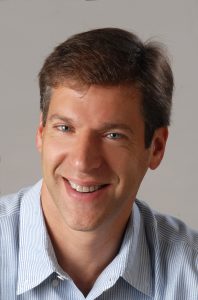
Daniel M. Kammen is Professor of Public Policy in the Goldman School of Public Policy, Professor in the Energy and Resources Group and Professor of Nuclear Engineering in the Department of Nuclear Engineering at the University of California, Berkeley. World Bank Group’s Chief Technical Specialist for Renewable Energy and Energy Efficiency from October 2010-November 2011.
Dr. Kammen’s research interests include: the science, engineering, management, and dissemination of renewable energy systems; health and environmental impacts of energy generation and use; rural resource management, including issues of gender and ethnicity; international R&D policy, climate change; and energy forecasting and risk analysis. He is the author of over 90 journal publications, a book on environmental, technological, and health risks (Should We Risk It?, Princeton University Press) and numerous reports on renewable energy and development. He has been featured on radio, network and public broadcasting television and in print as an analyst of energy, environmental, and risk policy issues and current events. His recent work on energy R&D policy appeared in Science, and Environment, and has been featured on PBS, KQED, CNN, and in many newspapers via the Reuters news service.
Lecture: “Engineering Earth’s Climate: Risks, Limitations, and Prospects”
October 13, 2010, 7:30-8:30 pm, Kane Hall 210
Dr. David W. Keith
Director, ISEEE Energy and Environmental Systems Group
Canada Research Chair in Energy and the Environment
Professor, Department of Chemical and Petroleum Engineering and Department of Economics, University of Calgary
Adjunct Professor, Department of EPP, Carnegie Mellon
About the Speaker
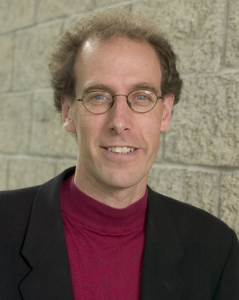
Professor Keith has worked near the interface between climate science, energy technology and public policy for twenty years. His work in technology and policy assessment has centered on the capture and storage of CO2, the technology and implications of global climate engineering, the economics and climatic impacts of large-scale wind power and the prospects for hydrogen fuel. As a technologist, Keith has built a high-accuracy infrared spectrometer for NASA’s ER-2 and developed new methods for reservoir engineering increase the safety of stored CO2. He now leads a team of engineers developing technology to capture of CO2 from ambient air at an industrial scale.
Keith took first prize in Canada’s national physics prize exam, he won MIT’s prize for excellence in experimental physics, was listed as one of TIME magazine’s Heroes of the Environment 2009 and was named Environmental Scientist of the Year by Canadian Geographic in 2006. He spent most of his career in the United States at Harvard University and Carnegie Mellon University before returning to Canada in 2004 to lead a research group in energy and environmental systems at the University of Calgary.
Keith has served on numerous high-profile advisory panels such as the UK Royal Society’s geoengineering study, the IPCC, and Canadian ‘blue ribbon’ panels and boards. David has addressed technical audiences with articles in Science and Nature, he has consulted for national governments, global industry leaders and international environmental groups, and has reached the public through venues such as the BBC, NPR, CNN and the editorial page of the New York Times.
Lecture: “Climate Change and Human Energy Usage: Constraints and Options”
Seminar: “World Energy Usage: Finding a Sustainable Trajectory”
May 14, 2008
Dr. Ralph J. Cicerone
President, National Academy of Sciences
About the Speaker
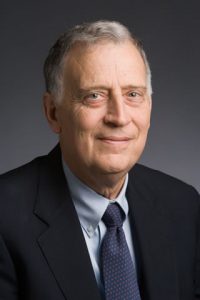
Dr. Ralph Cicerone received his Ph.D. from the University of Illinois. He is an atmospheric scientist whose research in atmospheric chemistry and climate change has involved him in science and environmental policy nationally and internationally. His work with Richard Stolarski in 1973 led to the discovery of the C10X chain mechanisms for depletion of stratospheric ozone. His research was acknowledged on the citation for the 1995 Nobel Prize in chemistry awarded to his colleague F. Sherwood Rowland. Cicerone was also the 1999 laureate for the Bower Award and Prize for Achievement in Science. He was awarded the 2002 Roger Revelle Medal by the American Geophysical Union, which recognized his outstanding research contributions to the understanding of Earth’s atmospheric processes, biogeochemical cycles or other key elements of the climate system. He was honored with the Albert Einstein World Award of Science in 2004 by the World Cultural Council for his research of “true benefit to mainkind.” Cicerone was the chancellor of the University of California, Irvine, before becoming president of the National Academy of Sciences.
Lecture: “The Science, Economics, Equity and Politics of Global Warming,”
Seminar: “Living Beyond Our Means: Natural Assets and Human Well-Being,”
May 1-2, 2007
Dr. Robert T. Watson
Chief Scientist and Director for Environmentally and Socially Sustainable Development for the World Bank
About the Speaker
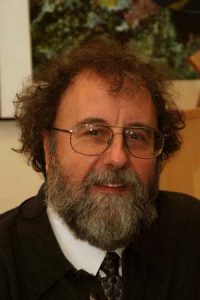
In May 1996, Dr. Watson joined the World Bank as Senior Scientific Advisor in the Environment Department. In July 1997, he became the Director of the Environment Department and Head of the Environment Sector Board.
Prior to joining the World Bank, Dr. Watson was Associate Director for Environment in the Office of Science and Technology Policy in the Executive Office of the President in the White House. Prior to joining the Clinton White House, Dr. Watson was Director of the Science Division and Chief Scientist for the Office of Mission to Planet Earth at the National Aeronautics and Space Administration (NASA).
Dr. Watson received his Ph.D. in Chemistry from London University in 1973. He has received many national and international awards and prizes for his contributions to science, including the American Association for the Advancement of Sciences Award for Scientific Freedom and Responsibility in 1993 and the insignia of Honorary Companion of St. Michael and St. George from the British Government on December 10, 2003.
Comments by Fleagle at Inaugural Reception
“There was a time when U. S. meteorologists were interested in matters of science policy only to the extent that they affected the budget of the Weather Bureau. Fortunately, there came to be enough distributed wisdom in government that expanded atmospheric research was encouraged in several agencies in this and other countries. Research results over time led to new understanding of atmospheric phenomena and recognition that human activities could harm the physical environment. As a result, interaction of science with policy has come to be far more sophisticated and complex than it used to be. Global aspects have become especially important.”
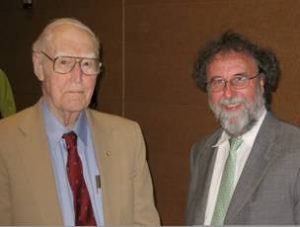
“The Fellowship being inaugurated tonight is intended to broaden understanding of the interaction of the atmospheric sciences with science policy for our students and faculty and the general public. We hope to appoint a series of Policy Fellows of eminence for short periods, at least one during the residence of each PhD graduate student. We are extremely fortunate to have Dr. Robert Watson to initiate the series. Dennis (Hartmann) will introduce him later on, so I will just say that his achievements in science and in policy provide him unique perspective. I am looking forward eagerly to hearing his views on the topics he has chosen for the lecture.”